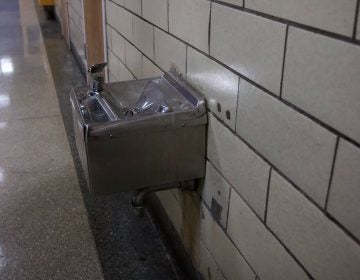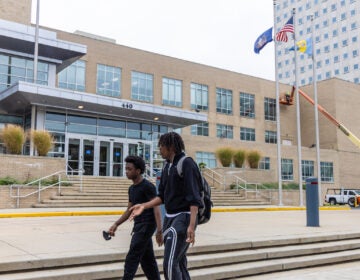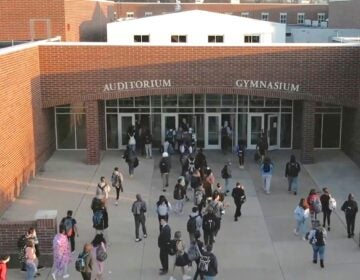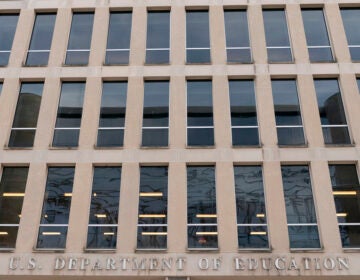School District of Philadelphia delays vote on extending Keystone Opportunity Zone
Whitney Jones said he wanted assurance economic benefit would be for the city and the school district, “so we’re not continuously signing our kids up for the short change.”

The board members of the School District of Philadelphia met last night to discuss KOZ extensions and charter school closures. (Nate Harrington/WHYY)
From Philly and the Pa. suburbs to South Jersey and Delaware, what would you like WHYY News to cover? Let us know!
The School District of Philadelphia’s board voted to delay a decision on extending six Keystone Opportunity Zone (KOZ) sites until their next meeting in September. Thursday night’s meeting was the last one before the 2025-26 school year begins.
Board members also deliberated on the impact of SEPTA cuts on students and employees and the potential closure of two charter schools.
What is a Keystone Opportunity Zone, and why does it matter?
A KOZ is a designated area that offers significant tax breaks for businesses and individuals to attract economic development, said Karen Fegely, acting commerce director for the city of Philadelphia.
Representing Mayor Cherelle Parker’s office, Fegely gave a presentation in favor of expanding the zones. She said that while businesses operating in KOZ sites receive tax breaks, the required Payment in Lieu of Taxes — which replaces property taxes — is set at 110% of the normal property tax rate.
However, the School District of Philadelphia also receives some of its revenue from business tax, which is one of the taxes waived as part of the KOZ program. The lost revenue from other taxes was not mentioned in the presentation.
While these tax breaks are temporary and normal taxation resumes after a period, board President Reginald Streater said he heard “the city is not getting the revenue it thought it would get.”
Only one of the properties has exited the KOZ program, which is when the normal tax rate hits the property and business, according to Deputy Commerce Director Dawn Summerville
Board member Crystal Cubbage asked Fegely’s team for numbers that show the benefits brought by these designated zones.
Cubbage did not get a direct answer. Instead, Summerville talked about Career Connected Learning, an additional program connected to the designated zones, which she said would create opportunities for high school kids to get hands-on experience at the companies that would occupy these zones.
Cubbage then asked for “the number of immersive experiences they have provided for students.”
“I want a number more than a narrative,” she said.
“If I’m honest, the Career Connected Learning program feels like an afterthought,” Cubbage said, wanting the program to be central to the process.
Board member Whitney Jones said he wanted to make sure the economic benefit comes both to the city and the school district.
“So we’re not continuously signing our kids up for the short change,” he said.
Of the eight members, seven questioned the members pitching KOZ extensions.
When it came time to vote on the consent agenda, board member Joyce Wilkerson asked to remove the approval site extensions.
The board deliberated on whether to approve, deny or shelve the vote. They decided to push the vote until September’s meeting.
“This gives us an opportunity to get the information we would need to support these KOZs,” Cubbage said.
The move to delay the vote elicited a “thank you” from meeting attendees.
SEPTA cuts loom over the first day of school
With impending cuts to the city’s transportation system taking effect the day before the first day of school, officials discussed the impact on the students, parents and faculty.
“More than 52,000” SDP students ride SEPTA, Superintendent Tony Watlington said during his opening presentation.
He suggested families visit SEPTA’s website for information.
“We’re also encouraging families to carpool, call your principal for additional information or assistance,” Watlington said. “We encourage more of our families to make use of the provision, where the district provides $300 to a family, if they bring their children to school, in lieu of some other opportunity.”
One parent wrote a letter of testimony asking what the school is doing to address the cuts if no resolution is passed.
Lisa Haver, a retired city teacher and one of the co-founders of the Alliance for Philadelphia Public Schools, asked about the cuts in the meeting.
“We saw no plan up there,” she said, referencing Watlington’s opening presentation.
Two charter schools face non-renewal
The board also voted not to renew KIPP North Philadelphia Charter School and People for People Charter School, citing poor academic performance. Both had been issued non-renewal notices in January.
KIPP North Philadelphia, founded in 2017, posted “middling and declining scores” and had high suspension rates, board Vice President Sarah-Ashley Andrews said.
People for People, one of the city’s oldest charters, has operated for more than 20 years. The board again pointed to weak test scores as the reason for non-renewal.
Editor’s Note: Nate Harrington’s WHYY News internship has been made possible thanks to the generous support from the Dow Jones News Fund O’Toole Family Foundation Internship.

Get daily updates from WHYY News!
WHYY is your source for fact-based, in-depth journalism and information. As a nonprofit organization, we rely on financial support from readers like you. Please give today.






